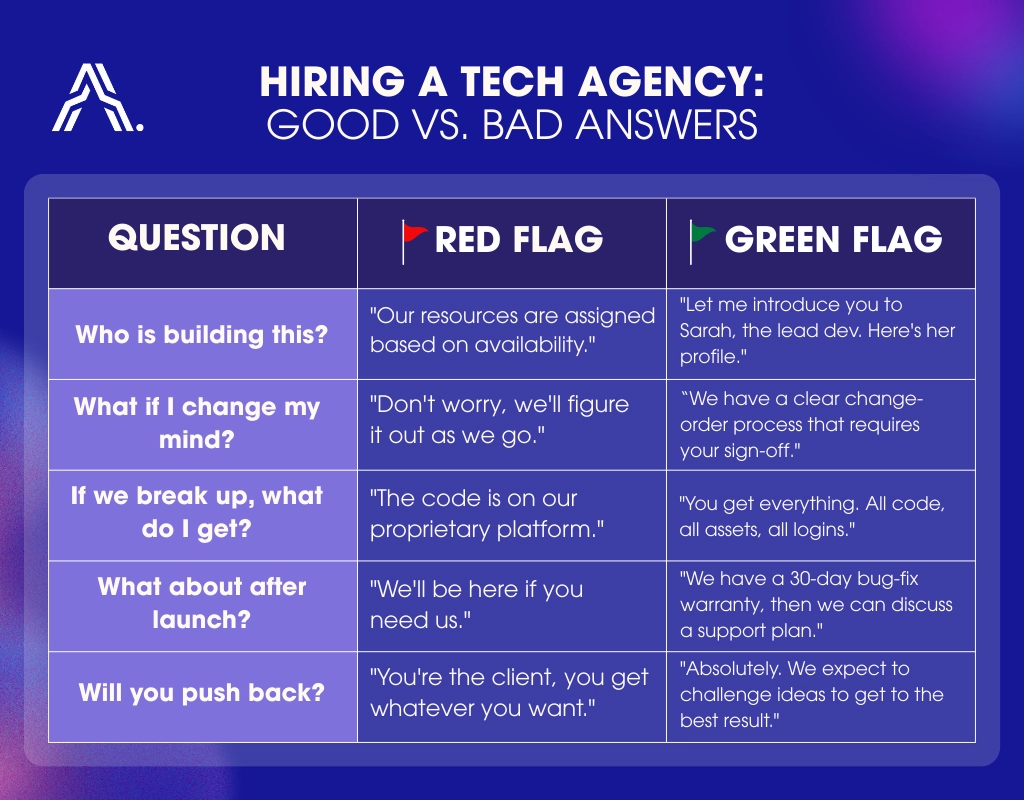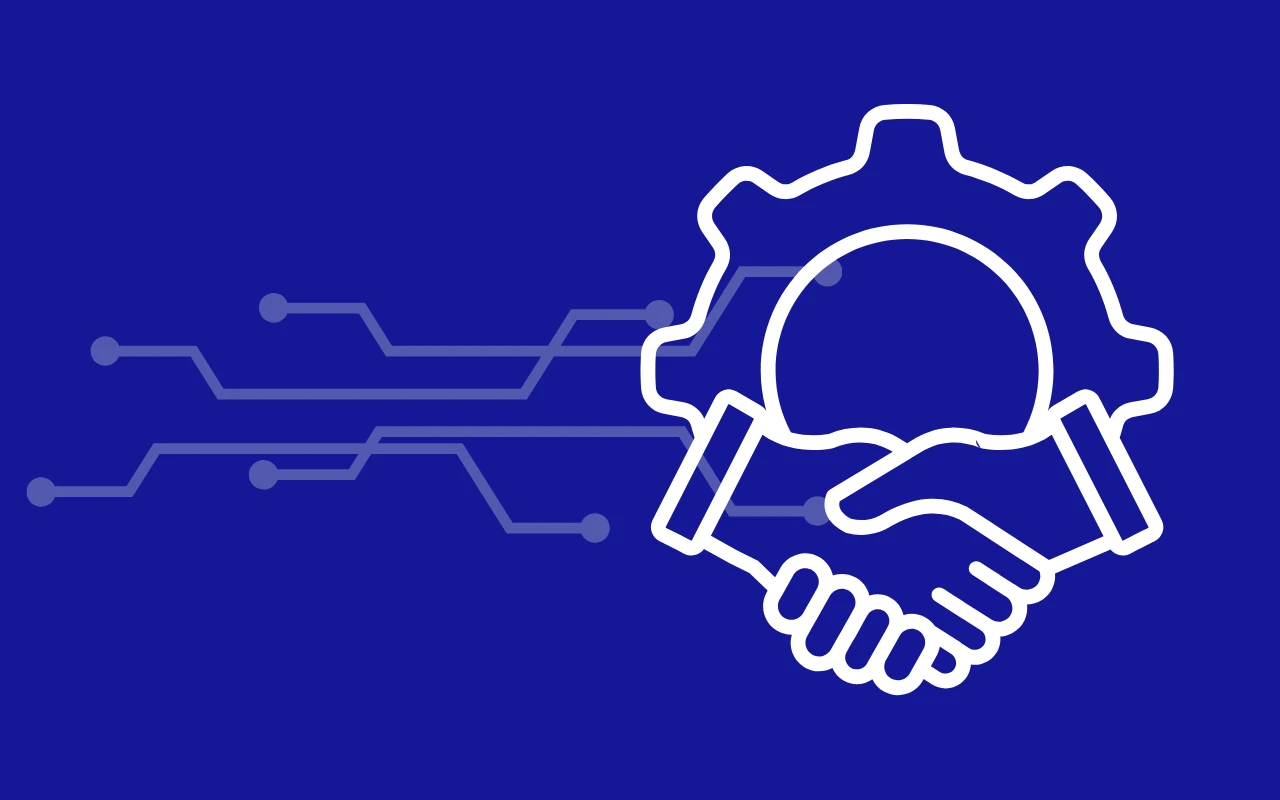Hiring a technical partner can feel like a high-stakes gamble. You have a solid idea and a budget. They have a slick presentation and a lot of promises. To make the right choice, you need the right questions to ask a tech agency.
Ultimately, the space between promises and delivery is where businesses get burned. That is why you should set aside the sales pitch and the polished portfolio. The only way to get a true sense of a team is to ask direct questions that require a thoughtful pause, not a rehearsed answer.
We’re sharing these because we are tired of hearing about partnerships that turned into nightmares. A well-informed client is the best kind of client. Here’s where you start.
1. Who, exactly, is building my product?
This question is vital. You often meet the senior team who sells the vision. But after the contract is signed, the project may be handed off to a junior team, or worse, to anonymous freelancers overseas.
Why you ask this:
Knowing whose hands are on your project is a matter of accountability. When vetting a tech agency, you’re paying for expertise, so you have a right to understand the experience and chemistry of the people involved.
What to listen for:
A trustworthy agency will be proud to introduce you to the project lead and key developers and share their experience. An evasive answer like, “we assign resources based on availability” or “your project manager will be the main point of contact” is a cause for concern. In short, you’re looking for names and faces, not just roles.
2. What happens when I change my mind?
No project plan survives first contact with reality. You will get new ideas. Market feedback will demand a change. This is guaranteed to happen. The industry calls it “scope creep,” but the business reality is the need for flexibility.
Why you ask this:
Asking this stress-tests their process and transparency. Specifically, their answer tells you if they see change as a moment for collaboration or as an opportunity to send a surprise invoice.
What to listen for:
You want to hear about a clear, predictable process. A great answer sounds like, “We’ll document the change, give you a clear estimate of the additional time and cost, and get your explicit approval before we proceed”. A red flag is a vague response like, “Don’t worry, we’re flexible” or “We can sort that out when it happens”. That is the foundation for a budget blowout.
3. If we break up, what do I walk away with?
Thinking about the end at the beginning is just smart business. A partnership with an agency can end for many reasons. Consequently, what you cannot afford is to have your own code, designs, or data held hostage by the people you paid to create it.
Why you ask this:
This question cuts directly to the issue of ownership. After all, when you pay for an asset to be created, you must be 100% certain that you own it, free and clear.
What to listen for:
The only acceptable answer is an immediate and unequivocal “you get everything.” This includes the complete source code, all design files, documentation, and full administrative access to every related account. If they hesitate, or start talking about licensing fees or proprietary platforms, you should be very cautious. It means you might be building on their property, not yours.
4. What’s our relationship like the month after you get my final payment?
A project isn’t over when the site or app goes live. In many ways, that’s when it truly begins. Bugs will appear and questions will come up. The period immediately after launch reveals the true character of the agency you hired.
Why you ask this:
The answer here separates the project-finishers from true long-term collaborators. The former takes your money and vanishes; meanwhile, the latter sticks around to ensure what you built together is successful.
What to listen for:
A better tech partner has a plan for this phase. They’ll talk about a warranty period for fixing bugs, a straightforward process for ongoing support, or different options for a monthly retainer. A blank stare or a generic, “we’ll be here if you need us” is not a plan. Ask them to define what “here” actually means in practice.
5. Will you tell me if my idea is bad?
Arguably, this might be the most important question of all. Remember, you are hiring experts for their thinking, not just their ability to type code. A team that blindly says “yes” to all your requests is not a partner but an order-taker, which can be a dangerous thing for your business.
Why you ask this:
The goal is to find a team that cares enough about your success to push back. In other words, people who will respectfully challenge your assumptions and suggest better ways to solve a problem, even if it means a more difficult conversation. Ultimately, it shows they’re invested in your business outcome, not just their invoice.
What to listen for:
The best possible answer is a story about a time they told a client “no” and explained why, leading to a better result. They should sound energized by the prospect of a healthy debate. The biggest red flag is a team that agrees with everything you say. They are either too inexperienced or too indifferent to have a real conversation, and neither is good for your business.
Real World Example:
And this isn’t just a theory. We recently worked with a founder in the e-commerce space who wanted to build a complex feature we knew their customers wouldn’t use. Pushing back was a tough conversation, but we suggested a much simpler solution instead. They listened. That simpler feature is now their most used, and it saved them two months and around $10,000 in development costs.
A Quick Reference Guide:
Here is a simple cheat sheet of what to listen for.

Going Deeper: The Complete Vetting Checklist
While these five questions are the essential starting point for any conversation. They cut to the heart of the relationship and reveal a lot about an agency’s character and process. But a truly thorough vetting process goes deeper. For instance, there are other important questions to ask about technology choices, communication styles, and how progress is tracked and measured.
We wanted to create a genuinely useful tool for anyone in this position. So, we’ve compiled a comprehensive checklist that includes the five questions from this article, plus seven more that cover the critical details. It’s a complete guide to help you make the best possible decision.
Use the exact questions we would expect a sharp client to ask us.
It comes down to one thing
Ultimately, these questions are all about finding a team that genuinely cares about your success.
At Autonomous, we call it “giving a fuck”. In practice, this philosophy building our team entirely in house, so the people you meet are the people doing the work. It means having the necessary, sometimes tough, conversations about budgets and ideas early on. It means we are interested in a long-term professional relationship, not a quick project.
If you are serious about results and looking for a real technical partner, you’re our kind of person.. We’re an open book with these questions and any others you might have.
Let’s have a real conversation about what you’re trying to build. You can schedule a call with us here. No sales pitch, just a straightforward discussion.

